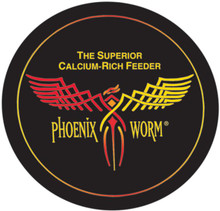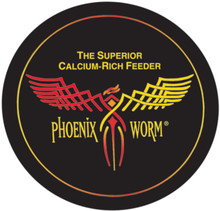Answer

Dec 07, 2020 - 06:01 AM
Phoenix Worms are the only calcium-rich feeder with the perfect balance of calcium and phosphorus, 1.5:1. This natural balance means that they can be a staple as your pet's diet.
Reptile breeders report that hatchlings that are fed Phoenix Worms right from the start are more than 30% larger than their clutch mates after just a few weeks. They also note higher activity levels and brighter colors for the babies that were fed Phoenix Worms.
Phoenix worms are the gold standard of feeders, but many crested geckos are slow to make the switch, especially if they are used to fast-moving feeders like crickets or dubia. However, it's very worth it to encourage them to make the switch since they are extremely high in calcium (you won't need to dust feeders anymore!). PS: Phoenix Worms are also a natural weapon against coccidia. In addition to having a perfect balance of calcium and phosphorus, they provide high levels of natural lauric acid. Lauric acid is known for its excellent antimicrobial properties including potent activity against lipid-coated viruses, clostridium, and pathogenic protozoa including coccidia.
Lauric acid is a medium-chain saturated fatty acid found in Phoenix Worms as well as some vegetable oils and in dairy products. 53% of the fat in Phoenix Worms is beneficial lauric acid, a proven antimicrobial effective against coccidiosis.
Reptile breeders report that hatchlings that are fed Phoenix Worms right from the start are more than 30% larger than their clutch mates after just a few weeks. They also note higher activity levels and brighter colors for the babies that were fed Phoenix Worms.
Phoenix worms are the gold standard of feeders, but many crested geckos are slow to make the switch, especially if they are used to fast-moving feeders like crickets or dubia. However, it's very worth it to encourage them to make the switch since they are extremely high in calcium (you won't need to dust feeders anymore!). PS: Phoenix Worms are also a natural weapon against coccidia. In addition to having a perfect balance of calcium and phosphorus, they provide high levels of natural lauric acid. Lauric acid is known for its excellent antimicrobial properties including potent activity against lipid-coated viruses, clostridium, and pathogenic protozoa including coccidia.
Lauric acid is a medium-chain saturated fatty acid found in Phoenix Worms as well as some vegetable oils and in dairy products. 53% of the fat in Phoenix Worms is beneficial lauric acid, a proven antimicrobial effective against coccidiosis.
![[RAINBOW MEALWORMS]](https://cdn2.bigcommerce.com/server700/236bd/product_images/uploaded_images/ask-us-a-question.png?t=1555860964&_ga=2.63975151.1964021392.1553523198-536666054.1553523198)




Add New Comment